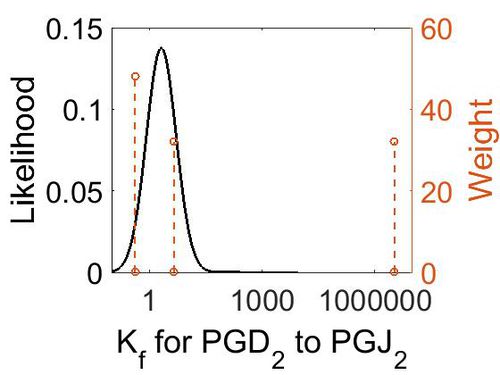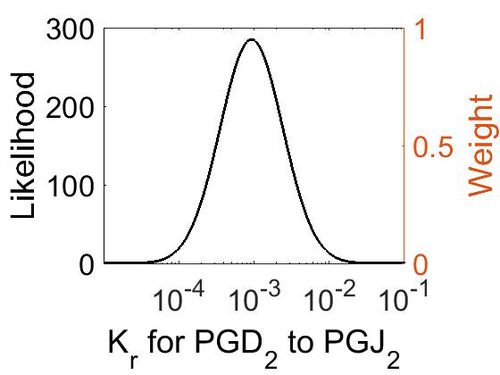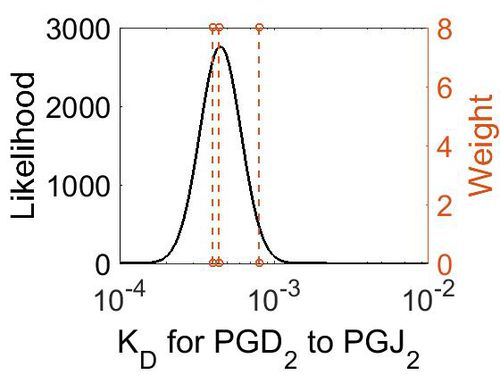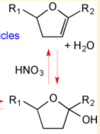Return to overview
PGD2 is subsequently converted to PGJ2 via a non-enzymatic dehydration reaction [1]. This dehydration reaction takes place in an aqueous solution and includes the removal of two hydrogens and one oxygen molecule. This reaction occurs across the C9 hydroxyl and the C10 carbon axis, to form a double bond between C9 and 10.
Reaction
Chemical equation

Rate equation
Parameters
Association Rate Constant (Kf)
Literature values
| Value
|
Units
|
Conditions
|
Substrate
|
Weight
|
Reference
|
| 3.3E+6 (excluded)
|
M-1 min-1
|
25°C and 0.055 ionic strength
|
H2CO3 to CO2
|
32
|
[2]
|
| 4.5
|
M-1 min-1
|
20°C
|
HC(OH)2COOH
|
32
|
[3]
|
| 0.42
|
M-1 min-1
|
20°C
|
HC(OH)2COO–
|
32
|
[3]
|
Description of the reaction 8 Kf distribution
| Mode (M-1 s-1) |
Confidence Interval |
Location parameter (µ) |
Scale parameter (σ)
|
| 4.48E+00 |
1.09E+03 |
7.34E+00 |
2.42E+00
|

The estimated probability distribution for reaction 8 Kf. The value and weight of the literature values used to define the distribution are indicated by an orange dashed line. The x axis is plotted on a log-scale.
Dissociation Rate Constant (Kr)
This is a “Dependent parameter”, meaning that the log-normal distribution for this parameter was calculated using multivariate distributions (this is discussed in detail here). As a result, no confidence interval factor or literature values were cited for this parameter.
Description of the reaction 8 Kr distribution
| Mode (M-1 s-1) |
Location parameter (µ) |
Scale parameter (σ)
|
| 9.25E-04 |
-6.07E+00 |
9.57E-01
|

The estimated probability distribution for reaction 8 Kr. The value and weight of the literature values used to define the distribution are indicated by an orange dashed line. The x axis is plotted on a log-scale.
Dissociation Constant
Literature values
| Value
|
Units
|
Conditions
|
Substrate
|
Weight
|
Reference
|
| < 8E-04
|
N/A
|
OH Radicals in the Presence of Added Gas Phase HNO3 (3 ppmv n-pentadecane, 0.25, 0.50, 1.0, or 2.0 ppmv HNO3, 10 ppmv O3, and 2 ppmv TME were added from a glass bulb in a flow of N2)
|
Acid-Catalyzed Dehydration of Cyclic Hemiacetals (n-Pentadecane) in SOA
|
8
|
[4]
|
| 4E-04
|
N/A
|
PH of 100 cc. 0-02N NaHCO3, saturated with C02, into which 0 95 cc.
|
H2CO3
|
8
|
[5]
|
| 4.4E-4
|
N/A
|
In a 0O008 mol. solution of carbonic acid at 4°, 1-23 % is present as H2CO3
|
H2CO3
|
8
|
[6]
|
Description of the reaction 8 KD distribution
| Mode (M-1 s-1) |
Confidence Interval |
Location parameter (µ) |
Scale parameter (σ)
|
| 4.49E-04 |
1.38E+00 |
-7.61E+00 |
3.07E-01
|

The estimated probability distribution for reaction 8 KD. The value and weight of the literature values used to define the distribution are indicated by an orange dashed line. The x axis is plotted on a log-scale.
Related Reactions
References
- ↑ Fitzpatrick, F. A. Wynalda, M. A., Albumin-catalyzed metabolism of prostaglandin D2. Identification of products formed in vitro, J Biol Chem (1983), 258, 11713-8.
- ↑ B. Gibbons "Rate of Hydration of Carbon Dioxide and Dehydration of Carbonic Acid at 25" J Biol Chem. 1963 Oct;238:3502-7
- ↑ 3.0 3.1 [hrcak.srce.hr/file/195437 Y.I. Tur'yan, "Kinetics and Equilibrium of the Dehydration-Hydration and Recombination-Dissociation Reactions of Glyoxylic Acid Investigated by Electrochemical Methods", CCACAA 71 (3) 727¿743 (1998)]
- ↑ A. Ranney "Kinetics of Acid-Catalyzed Dehydration of Cyclic Hemiacetals in Organic Aerosol Particles in Equilibrium with Nitric Acid Vapor" J. Phys. Chem. A, 2016, 120 (16), pp 2561–2568
- ↑ F. BUYTENDYK "A Study of the System Carbonic Acid, Carbon Dioxide and Water - Determination of the True Dissociation-constant of Carbonic Acid" Biochem J. 1927; 21(3): 576–584.
- ↑ Thiel and Strohecker (1914). Ber. deutsch. chem. Gem. 47, 945, 1061.






